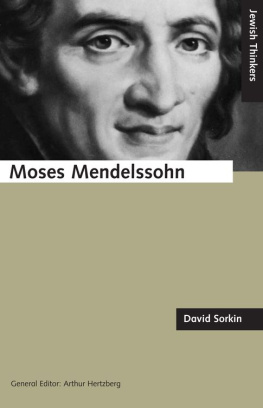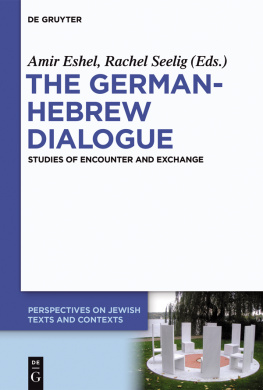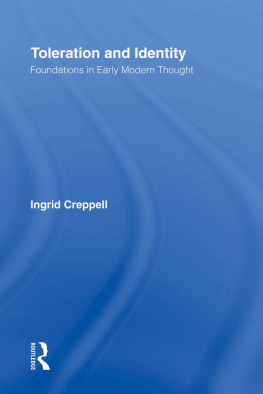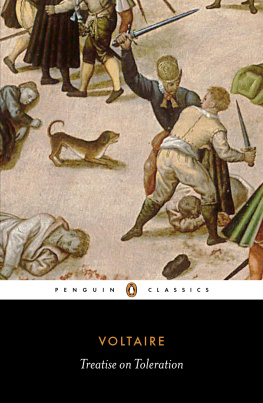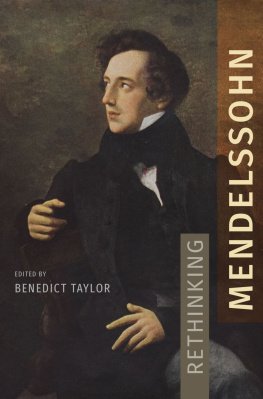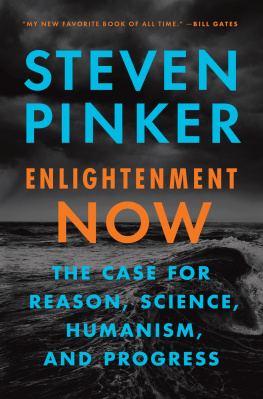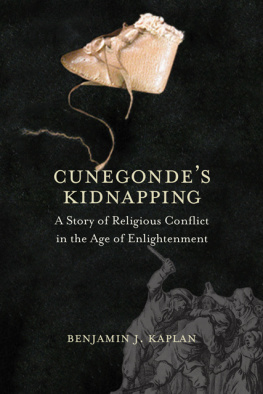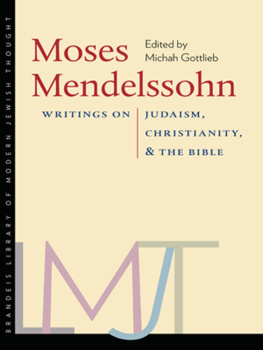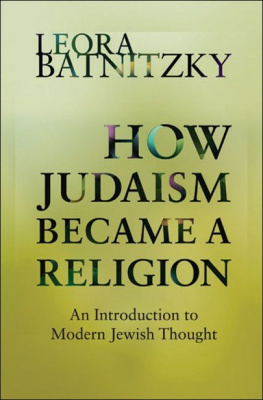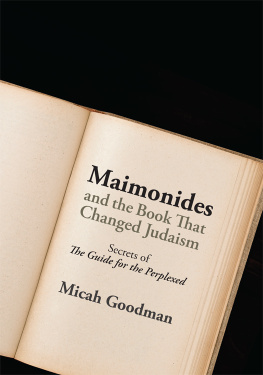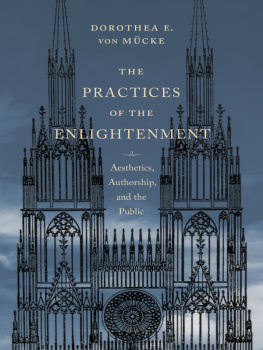JEWISH THINKERS
General Editor: Arthur Hertzberg
Moses Mendelssohn
and the Religious
Enlightenment
To Phoebe, Gideon, Isaac, and Naomi, who often took their meals with talk of Mendelssohn, without complaint and apparently without ill-effect on their digestion.
Contents
The reader wearied, if not bewildered, by the endless flood of literature on Moses Mendelssohn may justifiably ask: why a book? The answer is the need for a succinct and accessible interpretation of Mendelssohns Jewish thought. The authoritative biography by Alexander Altmann is so vast and vastly learned as to tax even the specialists abilities. This volume is intended to provide a serviceable introduction for the interested layperson or undergraduate, Judaica scholar or historian. Unlike Altmanns study, this is neither an intellectual biography nor a comprehensive study of Mendelssohns oeuvre.
While I explain my method in the introduction, one prior observation belongs here. It has become a time-honored practice to study Mendelssohn primarily, or even exclusively, from his German works. In attempting to understand Mendelssohn as a philosopher of the German Enlightenment this practice is appropriate. But in attempting to understand Mendelssohns thinking about Judaism it is untenable. Mendelssohns Jewish thought has been studied time and again on the basis of a narrow body of evidence, the political/philosophical essay Jerusalem,orOnReligiousPowerandJudaism and one or two other German works. That Mendelssohn wrote on Jewish subjects in Hebrew throughout his career has long been neglected. There is in English little if any scholarship on many of these Hebrew works, nothing that succinctly treats the entire Jewish corpus, and certainly nothing that concisely analyzes that corpus in relation to Mendelssohns general thought. One object of this book is to survey Mendelssohns Hebrew works in order to introduce them into the discussion of his Jewish thought. One contention of this book is that if we read his better-known German pronouncements on Judaism as part of the larger corpus, a different understanding of them emerges.
I discuss Mendelssohns German and Hebrew works in order to analyze his Jewish thought and delineate its place in the eighteenth century and its relationship to the medieval Jewish tradition. This volume will have discharged its duty if it serves as a map that enables readers to explore his thought further on their own.
I would like to thank Peter Halban and Arthur Hertzberg for inviting me to write this book for the series Jewish Thinkers, and I am grateful to Arthur Hertzberg for judiciously editing the manuscript. Through a fortunate turn of events the American edition is being published by the University of California Press. I am grateful to Stan Holwitz for his interest in this book and for expertly shepherding the manuscript through the various stages of publication. My thanks to Michelle Nordon for overseeing the production process and to Amanda Clark Frost for excellent copy editing.
A book such as this would be unthinkable without the splendid edition of Mendelssohns works begun by the Berlin Academy for Jewish Studies in honor of the bicentennial of his birth (1929), resumed in 1971 under the editorship of the late Alexander Altmann, and now being completed by an international team of scholars. It would also be unthinkable without Alexander Altmanns monumental scholarship, which has immeasurably enhanced our understanding of Mendelssohn.
A number of individuals deserve my gratitude. I am deeply indebted to my friend and former colleague at Oxford Daniel Frank, who helped to make this a better book by generously putting his knowledge at my disposal. Larry Dickey has brought relevant literature to my attention and happily discussed arcane points of eighteenth-century philosophy and political thought. Gabriel Sanders, a gifted undergraduate with an interest in Mendelssohn, was the first to cast a critical eye over the entire manuscript. Klaus Berghahn gave the manuscript a thorough reading and brought additional sources to my attention. Steven Beller encouraged me to sharpen my arguments. Michael Meyer criticized the work with his characteristic rigor. Edward Breuer gave the chapters on exegesis a close reading. Shmuel Feiner improved the manuscript with his expert knowledge of the Haskalah. David Myers far exceeded the call of collegiality or friendship in the time and energy he devoted to this book.
I wrote the first section of this book during the last of the six years I spent in the congenial setting of the Oxford Centre for Postgraduate Hebrew Studies and St. Antonys College. A semester at the Institute for Research in the Humanities at the University of Wisconsin offered an ideal venue in which to study Mendelssohns exegesis. I would also like to thank the British Academy for a grant that enabled me to read some rare publications at the Bayerische Staatsbibliothek and the Graduate School of the University of Wisconsin, which supported a visit to the Hebrew University and National Library, Jerusalem.
| 1671 | Jews readmitted to Berlin |
| 1672 | Jews officially permitted to reside in Dessau |
| 1719 | Christian Wolff publishes the first of his German philosophical treatises |
| 1729 | Mendelssohn born in Dessau, September 6 |
| 1733 | Publication of Reinbecks ConsiderationsontheAugsburgConfession |
| 1741 | Publication of Israel Samosczs NetsahYisrael (Glory of Israel) |
| 1742 | Publication of Siegmund Jacob Baumgartens InterpretationofHolyScripture
Republication of Maimonides GuideofthePerplexed |
| 1743 | Mendelssohn arrives in Berlin |
| 1750 | Mendelssohn appointed tutor to the Bernhard family |
| 1753 | Publication of Robert Lowths TheSacredPoetryoftheHebrews |
| 1754 | Mendelssohn appointed a clerk in the Bernhard silk factory Publication of PhilosophicalDialogues |
| 1755 | Publication of LettersontheSensations
Translation of Rousseaus DiscourseontheOriginsandFoundationsofInequality
Joins Learned Coffeehouse
Publication of ThePreacherofMorals (probable date) |
| 1756 | Contributes to the moral weekly, DerChamleon
Publication of Naphtali Herz Wesselys Levanon |
| 1760 | Publication of LogicalTerms |
| 1761 | Appointed manager in Bernhard silk firm
German works published as PhilosophicalWritings |
| 1762 | Marriage to Fromet Gugenheim |
| 1763 | Berlin Academy awards him first prize for TreatiseonCertaintyinMetaphysicalPhilosophy
Exempted from taxation by Jewish community |
| 1767 | Publication of Phaedon |
| 1768 | Appointed joint owner of Bernhard silk firm |
| 1769 | Intercession in Altona
Lavater affair
Writes TheBookoftheSoul |
| 1770 | Publication of commentary to Ecclesiastes
Begins to translate Psalms |
| 1771 | Elected but not appointed to Berlin Academy |
| 1772 | Intercession in Mecklenburg-Schwerin |
| 1774 | Begins translation of Pentateuch (probable date) |

